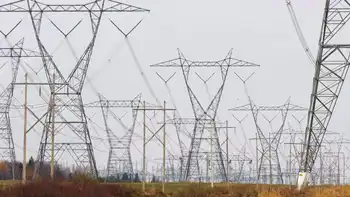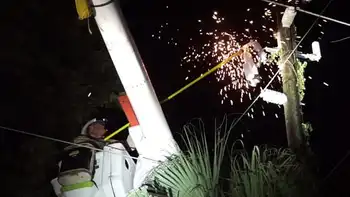Europe, U.S. should triple price of carbon: officials
By Industrial Info Resources
Arc Flash Training CSA Z462 - Electrical Safety Essentials
Our customized live online or in‑person group training can be delivered to your staff at your location.

- Live Online
- 6 hours Instructor-led
- Group Training Available
The call to arms was made by former Dutch Prime Minister Ruud Lubbers at the keynote session, at the start of the Power-Gen Europe 2010 conference in Amsterdam. Citing the failure of international climate change treaties, such as Copenhagen and Kyoto, to entice developing nations to agree to binding CO2 reduction targets, Lubbers said that it is now up to the U.S. and Europe to lead the way. He suggested that a carbon price of 50 euros US $59.64 per metric ton of carbon needs to be embraced to make it more attractive to reduce carbon emissions in developing nations. However, this is a very optimistic demand, since the current carbon price stands at just 15.5 euros US $18.49 per metric ton.
"The time has come in our world to give in our economies a price for CO2," Lubbers said. "We have an emissions rights system in Europe. It is still not good enough, but it is improving. The European Union EU and the U.S., the two most mature economic blocs, really require a carbon price in the order of magnitude of 50 euro per tonne for CO2. That would serve of course, not only carbon capture and storage CCS, but all other dimensions going towards CO2 poor economies."
He continued: "The world is divided in stages of development. We need common but different shades of responsibility. We need the Chinese, Brazilians and the Indians to accept what we are doing, but my answer is that it is not very practical [as it stands]. My suggestion is that in Mexico that the two big economies of Europe and the U.S. take the lead with this 50-euro-per-ton approach and to invite these other nations only to come there to explain what they are doing. There is this misunderstanding that progress is only made by treaties."
However, in the current economic climate, it seems doubtful that there will be such a dramatic rise in the carbon price. The EU's emissions trading scheme ETS carbon price will stay low for years, according to E.U. climate action commissioner Connie Hedegaard. In the past, Hedegaard has called for the price to be raised to about 30 euro US $35.78 per ton of CO2 for it to be an effective incentive for businesses to invest in low-carbon technology. At a recent conference, though, she admitted: "The recession has pushed down the carbon price for the foreseeable future. It is not good that the incentive to innovate has been reduced."
Hedegaard previewed a new European Commission analysis of the implications associated with increasing the 2020 emissions reduction targets from 20 to 30 from 1990 levels. She said that the carbon price will stay low, even after the economy recovers.
At Power-Gen, Lubbers highlighted the importance of carbon capture and storage technologies, since it is now widely accepted that fossil-fueled power plants will remain a key part of the energy mix for decades to come. Lubbers has worked with the Rotterdam Climate Initiative overseeing the progress of numerous CCS pilots.
"In the Rotterdam area alone, we concluded some time ago that it is possible to reduce CO2 emissions by 50 by 2025, from the baseline in 1990," he said. "It was quite spectacular in the Netherlands, actually, since the Dutch government said it would take until 2050. How is that possible, they said, and the answer was quite simple: we see an enormous potential for CCS. It's not only CCS, but also renewable, like the enormous potential of wind, and there can be more done on the energy efficiency front."











